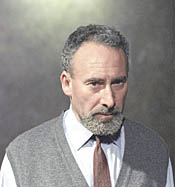One of the most important theatrical events I’ve had the good luck to cover in my five years at The Wall Street Journal is coming to PBS later this month. Primo, Sir Anthony Sher’s one-man stage version of If This Is a Man, Primo Levi’s Holocaust memoir, airs on Great Performances April 24.
 Here’s what I wrote three years ago about the Broadway transfer of this extraordinary show:
Here’s what I wrote three years ago about the Broadway transfer of this extraordinary show:
“Primo” is a very great piece of theater, but the tale, not the teller, is what matters most, and it is to their credit that Sir Anthony and Richard Wilson, his director, have opted for stark simplicity in presenting “If This Is a Man” (originally published in the U.S. as “Survival in Auschwitz”). The set, designed by Hildegard Bechtler, consists of a few concrete walls, a shovelful of gravel and a single wooden chair. Into this cold, bare space walks the bespectacled Sir Anthony, wearing an old cardigan. “It was my good fortune,” he says matter-of-factly, “to be deported to Auschwitz only in 1944…I was 24, with little wisdom, no experience, and a tendency–encouraged by the life of segregation forced on me by the racial laws–to live in an unrealistic world of my own.” Then, without further ado, he flings you into the bowels of hell.
As I sat in my aisle seat waiting for “Primo” to start, I wondered what so eloquent a book had to gain from dramatic presentation, however minimal. Might it not be even more effective for Sir Anthony merely to stand at a lectern and read it out loud? Within five minutes I knew better. The genius of his acting lies in its extreme understatement. When the Nazis order him to strip naked, he takes off his glasses and pushes up his sleeves, hinting at his humiliation by furtively sliding a hand over his crotch. His voice grows steadily higher in pitch–first quizzical, then astonished. That’s all he does, and all it takes: Levi does the rest, recounting the unimaginable horrors of Auschwitz with the laconic poise of a man who knows his tale needs no embellishing.
The ultimate proof of the purity and immediacy of this performance is that you come away from it thinking not about Sir Anthony, or even Primo Levi, but the story they have told together. Resounding in my ears as I left the theater were the climactic words in which Levi described the Russian soldiers who liberated Auschwitz: “They seem overwhelmed, not just by compassion but something else, something that seals their lips and keeps their eyes fixed to the scene around them. It’s shame. We know this shame. It’s the same that swamped us after the selections, and every time we had to watch, or submit to, some outrage. It’s the shame that the just man feels at another man’s crime…a feeling of guilt, that such a thing even exists…”
Mark your calendar–now.
* * *
For more information, go here.
